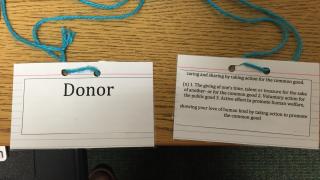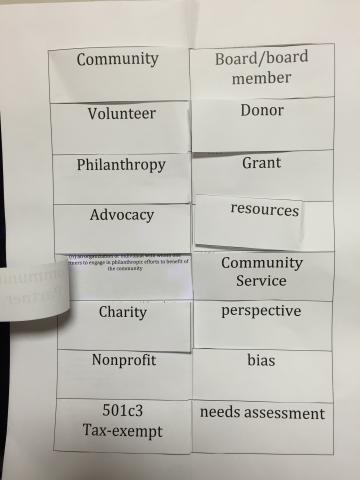Play matching games on teams to gain familiarity with terms associated with philanthropy.
Author: Urban EdVenture Faculty
The learners will
- develop familiarity with the vocabulary of philanthropy.
- communicate and collaborate through teamwork.
- timer
- vocabulary necklaces (yarn, 2 index cards per necklace, vocabulary words and definitions)
- copies of the Vocabulary Study Tool
- glue sticks
- scissors
All participants form a circle and receive one vocabulary necklace per person. They hang a vocabulary word in front and a definition in back (on a piece of yarn around their neck). The definition and word DO NOT match. This is a matching game.

Play the game:
- One player has the vocabulary word “philanthropy” on their necklace. Ask the person next to them in the circle to read aloud the definition on their back. They will rapidly realize this is not the definition for the word.
- Explain that this definition matches the vocabulary word on someone else's necklace.
- Using context clues and prior knowledge, the players will work together as a team to find matches. “When you find the definition for your word on someone else’s back, stand behind them.” Encourage them to use teamwork skills to help one another.
- The game ends when a circle is formed and every word is connected to a definition.
- Have them read the vocabulary words and definitions around the circle - correcting for mispronunciation and explaining definitions as needed.

Construct the Vocabulary Study Tool:
- Distribute the two pages of the handout below.
- They cut on dotted lines only (around the vocabulary, not around the definitions).
- They spread glue in the margins of sheet two and paste sheet one on top.
- The vocabulary “doors” open to reveal definitions below so they can practice and learn the words.
In a reflection, write about the following: When you are studying something new, why is it important to understand the associated vocabulary? Share a time when you experienced this.
In a reflection, write about the following: When you are studying something new, why is it important to understand the associated vocabulary? Share a time when you experienced this.
A Word About Reflection: Reflection may take the form of a whole class discussion, asking for volunteers to share after completing a reflection, or keeping written reflections private. The type of reflection can depend on several factors, including the time left after other activities are completed, the tone of the class, how personal the reflection topic may be, and how strong the class bond is.